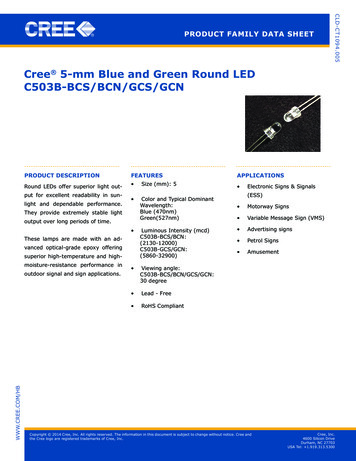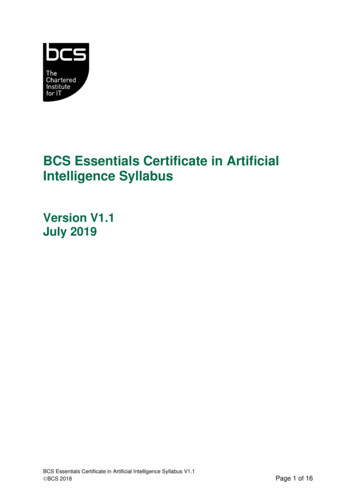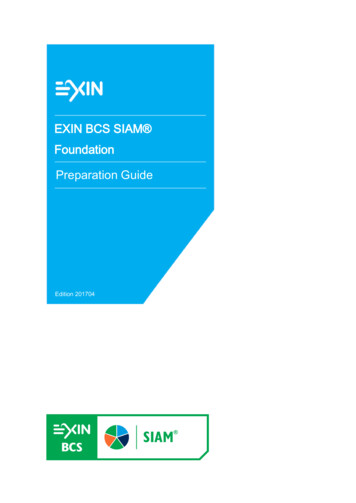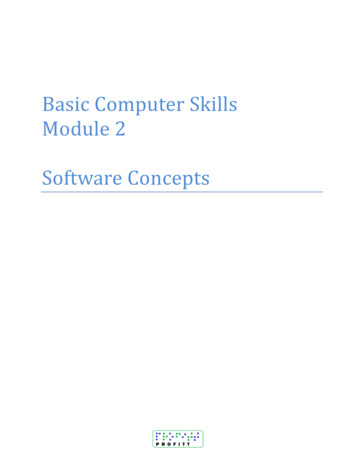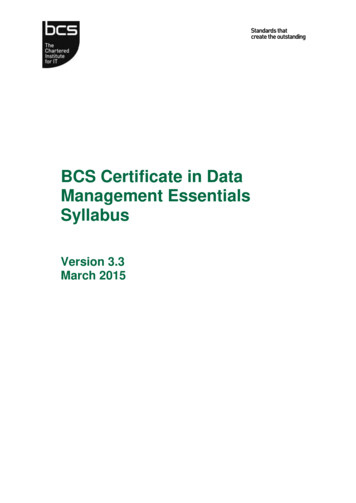
Transcription
BCS Certificate in DataManagement EssentialsSyllabusVersion 3.3March 2015
Change HistoryAny changes made to the syllabus shall be clearly documented with a change history log.This shall include the latest version number, date of the amendment and changes made.The purpose is to identify quickly what changes have been made.VersionNumberChanges MadeVersion 3.3March 2015Updated language requirements for extra time and use ofdictionaries. Added Reading List. Standardised the trainerrequirementsVersion 3.2September 2012Updated the additional time requirements and removed definition ofterminology. Added a section to cover excerpts from BCS booksVersion 3.1August 2012Added in details of extra time for foreign language candidatesVersion 3.0May 2012Logos and footers updated. Reference to ISEB removed throughoutdocument. Document control sheet updated. No change to contentof the syllabus.Copyright BCS 2015DME SyllabusVersion 3.3 March 2015Page 1 of 7
BCS Certificate in Data Management EssentialsContentsChange History . 1Learning Outcomes . 4Course Format and Duration . 4Eligibility for the Examination . 4Duration and Format of the Examination . 4Additional time for candidates requiring Reasonable Adjustments due to a disability . 5Additional time for candidates whose language is not the language of the examination . 5Excerpts from BCS Books . 5Levels of Knowledge / SFIA Levels . 51.Data Management Introduction . 61.11.21.31.41.52.66666Data Administration . 62.12.22.32.42.52.62.72.82.92.102.113.The role / authority of data managementThe Data CharterRoles and responsibilities within data managementData Architecture conceptsData Management tools and techniquesData analysis and data usageData definitionMetadata principlesQuality assurance and naming conventionsEnsuring data integrityManaging data replicationData privacy, security and recoveryImpact of packages on data administrationData Modelling (project vs. corporate)Functional analysis role‘Data over time’ issues66666666666Database Administration . 63.13.23.33.43.53.63.7Physical Data designDesign of non-traditional databasesDBMS selectionManaging the DBMSPerformance measurement and tuningDistributed DBMS issuesClient / Server issuesCopyright BCS 2015DME SyllabusVersion 3.3 March 2015Page 2 of 76666666
4.Repository Information . 64.14.24.34.44.55.The role of the data dictionaryProject vs. corporate dictionary issuesData dictionary and repository product featuresChange controlSecuring the data dictionary66666The Scope of the Data Management Function . 65.15.25.35.45.5‘Structured Data’ operational systemsData warehousing, OLAP and Data Mining systemsMulti-media systemsInternet and Intranet-based systemsObject Management66666Format of the Examination . 7Trainer Criteria . 7Classroom Size . 7Recommended Reading List . 7Copyright BCS 2015DME SyllabusVersion 3.3 March 2015Page 3 of 7
Who is it aimed at?The certificate is relevant to anyone requiring an understanding of data / databasemanagement.Learning OutcomesHolders of the BCS Certificate in Data Management Essentials should be able to: Act as members of a Data Management team within an organisation Implement an industry standard "best practice" approach to their Data Managementwork Understand the roles and skills required in database administration, dataadministration and repository administration Contribute to Technology Direction Evaluation Aid in the construction of a Data Charter Practise basic data administration, database administration and repositoryadministration skills Develop procedures for managing an organisation's corporate data resourceCourse Format and DurationCandidates can study for this certificate in two ways: by attending training courses providedby BCS Examination Providers or by self-study.It is the view of BCS that, for full coverage to be achieved, training courses leading to thecertificate should normally run for 21 hours.The course can be delivered a number of different ways from traditional class-room basedtraining to online e-learning.Eligibility for the ExaminationThere are no specific pre-requisites for entry to the examination. However, candidatesshould be suitably prepared and possess the appropriate skills and knowledge to fulfil theobjectives above.Duration and Format of the ExaminationThe format for the examination is a one hour written examination based on a businessscenario preceded by 15 minutes reading time. The examination is open book (you can takewritten material into the examination room). Candidates need to achieve a minimum of 50%pass the examination. Candidates who are awarded a pass for the examination areawarded the BCS Certificate Data Management Essentials.Copyright BCS 2015DME SyllabusVersion 3.3 March 2015Page 4 of 7
Additional time for candidates requiring ReasonableAdjustments due to a disabilityCandidates may request additional time if they require reasonable adjustments in line withthe BCS reasonable adjustments policy. It will be the Examination Provider’s responsibilityto make a decision regarding candidate eligibility and keep a record of the decision. This issubject to audit by BCS.Additional time for candidates whose language is notthe language of the examinationIf the examination is taken in a language that is not the candidate’s native / official languagethen they are entitled to 25% extra timeIf the examination is taken in a language that is not the candidate’s native / official languagethen they are entitled to use their own paper language dictionary (whose purpose istranslation between the examination language and another national language) during theexamination. Electronic versions of dictionaries will not be allowed into the examinationroom.Excerpts from BCS BooksExamination Providers may include excerpts from BCS books in the course materials. If youwish to use excerpts from the books you will need a license from BCS to do this. If you areinterested in taking out a licence to use BCS published material you should contact the Headof Publishing at BCS outlining the material you wish to copy and the use to which it will beput.Levels of Knowledge / SFIA LevelsThis course will provide candidates with the levels of difficulty / knowledge skill highlightedwithin the following table, enabling them to develop the skills to operate at the levels ofresponsibility indicated.The levels of knowledge and SFIA levels are explained at www.bcs.org/levelsLevelK7K6K5K4K3K2K1Levels of knowledgeLevels of skill and responsibility mberSet strategy, inspire and mobiliseInitiate and influenceEnsure and adviseEnableApplyAssistFollowCopyright BCS 2015DME SyllabusVersion 3.3 March 2015Page 5 of 7
Syllabus1.Data Management Introduction1.11.21.31.41.5The role / authority of data managementThe Data CharterRoles and responsibilities within data managementData Architecture conceptsData Management tools and techniques2.Data ata analysis and data usageData definitionMetadata principlesQuality assurance and naming conventionsEnsuring data integrityManaging data replicationData privacy, security and recoveryImpact of packages on data administrationData Modelling (project vs. corporate)Functional analysis role‘Data over time’ issues3.Database Administration3.13.23.33.43.53.63.7Physical Data designDesign of non-traditional databasesDBMS selectionManaging the DBMSPerformance measurement and tuningDistributed DBMS issuesClient / Server issues4.Repository Information4.14.24.34.44.5The role of the data dictionaryProject vs. corporate dictionary issuesData dictionary and repository product featuresChange controlSecuring the data dictionary5.The Scope of the Data Management Function5.15.25.35.45.5‘Structured Data’ operational systemsData warehousing, OLAP and Data Mining systemsMulti-media systemsInternet and Intranet-based systemsObject ManagementCopyright BCS 2015DME SyllabusVersion 3.3 March 2015Page 6 of 7
Format of the ExaminationTypeScenario based written examinationDuration1 hour preceded by 15 minutes reading time. Candidates areentitled to an additional 15 minutes if they are sitting theexamination in a language that is not their native/official language.None, although accredited training is strongly recommendedYesYes50%Calculators cannot be used during this examinationNonePaper based examination onlyPre-requisitesSupervised / InvigilatedOpen BookPass MarkCalculatorsDistinction MarkDeliveryTrainer CriteriaCriteria Hold the BCS Certificate in Data Management Essentials Have 10 days training experience or a train the trainer qualification Have a minimum of 3 years’ experience in data managementClassroom SizeTrainer to candidate ratio1:16Recommended Reading ListTitle: Business Analysis 3rd EditionAuthor: Debra Paul, Donald Yeates and James CadlePublisher: BCSPublication Date: September 2014ISBN: 978-1780172774URL: http://shop.bcs.orgTitle: Principles of Data Management: FacilitatingInformation SharingAuthor: Keith Gordon Publisher: BCSPublication Date: November 2013URL: http://shop.bcs.orgCopyright BCS 2015DME SyllabusVersion 3.3 March 2015Page 7 of 7
management. Learning Outcomes Holders of the BCS Certificate in Data Management Essentials should be able to: Act as members of a Data Management team within an organisation Implement an industry standard "best practice" approach to their Data Management work Understand the roles and skills required in database administration, data
